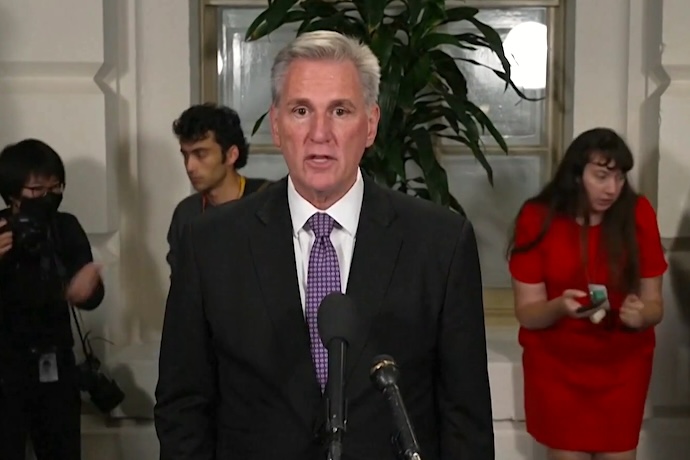As the New Year approaches and gift guides (and pleas for support) litter our inboxes, let’s take some time to reflect upon 2023. As I’ve previously stated, this is rarely a joyous occasion in my line of work, but I promise we will close this review with a (somewhat brief) silver linings section (gotta have a reason to keep going, don’t we?)
2023 was the first full year without Roe. Ever since the Supreme Court—specifically the “Federalist Society Six”—delivered the Christian Right a historic victory with its ruling in the Dobbs case, striking down both Roe and Casey, the horrific consequences have been unfolding. Again and again, the GOP and the Christian Right have demonstrated that, contrary to the repetition of “pro life” marketing slogans by forced-birth activists, they have little concern for life.
US public opinion hasn’t changed since the fall of Roe; if anything, numbers in support of reproductive rights have risen. Indeed, the issue of abortion rights has remained a losing strategy for the Republican Party since the end of Roe, even in deep-red states. In every major election since, where abortion has been an issue, Republicans have lost. In ballot initiatives and local elections up and down the country—Kansas, Kentucky and Virginia—voters rejected Republicans’ attacks on abortion rights.
Normally, in a functioning democracy, if parties don’t win elections with their positions, they have two options: change or moderate their views so they align more with the public—or accept a permanent role in the opposition. The GOP has made it increasingly clear that it intends to do neither. The Republican Party, firmly in the hands of the far-right, has chosen to openly reject democracy. This year, the Republican Party and the American Right loudly proclaimed their opposition to democracy as a form of government.
As their main policy positions on abortion, gender affirming care and LGBTQ rights remain deeply unpopular with Americans, they are increasingly done pretending. After the GOP lost badly in Virginia’s elections when voters thwarted governor Glenn Youngkin’s plan to pass a 15-week abortion ban, J.D. Vance, senator for Ohio, confirmed that the GOP’s “states’ rights” rhetoric on abortion has always been a smoke screen. CNN’s Manu Raju wrote about his exchange with Vance:
J.D. Vance, the Ohio GOP senator, says Republicans need to shift their approach on abortion and begin to embrace federal legislation—namely a 15-week ban with exceptions. ‘We can’t give into the idea that the federal Congress has no role in this matter,’ he told us.
On Newsmax, Rick Santorum declared:
Thank goodness that most of the states in this country don’t allow you to put everything on the ballot, because pure democracies are not the way to run a country.
This slogan, a “Republic, not a Democracy,” often repeated by senator Mike Lee of Utah, is not an invention of the current GOP—it’s a chorus that echoes back to the far-right anti-communist John Birch Society. Founded in 1958 by a candy manufacturer and wide-eyed conspiracy theorist, the JBS prided itself on employing the stealth tactics of its enemies—communist cells—and helped set up a belief system whose influence can still be seen in the modern GOP’s crackpottiest conspiracy theories and tendency to label any and all political enemies “Communists” and “Marxists.”
The distaste for democracy is a sentiment shared by the third-most powerful person in US politics, and second in line—after the Vice President—to the presidency, the current Speaker of the House, Mike Johnson, who has voiced his rejection of democracy as a political system on multiple occasions—in sermons as well as in interviews.
The ascension of Johnson, a theocrat, to the Speakership and third in line to the presidency, as a “compromise candidate” wasn’t a warning sign of the anti-democratic path the GOP has embarked on so much as an ear-splitting alarm with flashing red lights. It should have cast the spotlight on the ideology and theology that his politics are led by—and yet, with a few notable exceptions, many large media outlets failed to accurately contextualize Johnson’s shocking past statements that continued to make headlines (despite his team’s frenzied efforts to scrub his digital footprint) with the little-known theological tradition that informs and influences it: Christian Reconstructionism, dominion theology—the dream of an American theocracy.
Fortunately, scholars and journalists like Fred Clarkson, Sara Diamond, Julie Ingersoll, Kristin Kobes Du Mez, Sarah Posner, Katherine Stewart, and others have been tireless in their grounded, thoughtful analyses, and have provided incredibly valuable context and historical background to Johnson’s worldview. The fact that Johnson, an avid enemy of democracy and pluralism—one of the leading architects of the attempts to overturn the 2020 election in the Courts—is the GOP’s new leading man in the House, is a clear indication of where the party is headed in 2024. Moderation is not an option—quite the opposite. No matter how long Johnson manages to cling on to the job, before he eventually gets eaten by one of his own (see: John Boehner, Paul Ryan and, most recently, Kevin McCarthy), one thing is clear: The GOP has turned its back on democracy, and is out to destroy and walk back all the civil rights progress since the 1960s.
A conservative supermajority gone wild
The most important battlefield for the GOP when it comes to rolling back civil rights protections? The Supreme Court. While 2023 was projected by some analysts to be a more “quiet” term than the previous one, which had delivered the Dobbs ruling, the Supreme Court nevertheless managed to wreak havoc this year.
Among the worst was the ruling in a case that should never have been heard at all, because it was completely made up. Christian web designer Lorie Smith, who had never been asked to design a wedding website at all, let alone one for a gay couple, was fretting over her theoretical right to discriminate against LGBTQ people due to sincerely held bigotry.
In a highly unusual move, the Supreme Court agreed to hear the case, 303 Creative v. Elenis—and affirmed, in a 6-3 decision, the right of conservative Christian business owners to discriminate against LGBTQ people by denying them service, because apparently not discriminating against them would violate their freedom of speech. This ruling, as various legal experts have warned, is not only catastrophic for the rights and safety of LGBTQ people, but also opens the door to the discrimination of other marginalized groups.
Once upon a time, affirmative action had been a part of the Republican Party’s agenda—but those times are long gone. And in Students for Fair Admissions, Inc. v. Presidents and Fellows of Harvard College, the Supreme Court’s right-wing majority finally delivered conservatives another important victory they’d been longing for ending affirmative action for colleges and universities (at least for non-White people). As Madiba K. Dennie writes for Balls and Stripes—the John Roberts-written majority opinion was quintessential Roberts:
In a classic Roberts move, the Court did not say outright that it was overruling its many precedents recognizing the constitutionality of affirmative action, which were lawful under the 14th Amendment until Thursday.
But the upshot of its opinion is clear: Public universities, as well as the sea of private ones that accept federal funds, may no longer engage in the holistic review process of college applicants that has for decades enabled modest but important increases in racial diversity on college campuses. One footnote in Roberts’ opinion suggests a carveout for armed services, justifying it with a quick reference to the military’s unspecified but “potentially distinct interests.” Apparently race must be ignored at all costs when young people of color have a chance to learn, but not when they have a chance to lay down their lives.
In 2024, conservatives, not content with having killed affirmative action, appear to be coming for DEI programs next.
In 2022, the court dealt a devastating blow to gun control in New York State Rifle & Pistol Association v. Bruen, where the 6-3 majority opinion, written by Clarence Thomas, showed the might of the conservative super majority by broadening the scope of the Second Amendment, with Thomas claiming that gun laws must be rooted in the country’s “history and tradition” in order to be constitutional.
The fallout from this case is potentially catastrophic—and has led to SCOTUS hearing oral arguments in a new case, United States v. Rahimi this November, where it will be decided whether or not a domestic abuser has the constitutional right to own a gun (yes, seriously). The Fifth Circuit Court of Appeals had previously ruled that the domestic abuser in question did have the right to own a deadly firearm—a decision that, while horrifying, was in line with SCOTUS’ ruling in Bruen in 2022.
And, as scandals kept rocking the Supreme Court’s already damaged public standing even further (from Gorsuch’s house sale—to the head of a law firm that routinely argues in front of the Court; to Clarence Thomas’ financially lucrative friendship with right-wing billionaire Harlan Crow; his wife’s insurrectionist activities; shady leaks; justices socializing with the American Right; and lavish trips paid for by right-wing billionaires), they decided this year to cover up the crisis with a rhetorical fig leaf. In November, the Court revealed the “ethics code” they’d drafted themselves which, not only isn’t being enforced by anyone except SCOTUS itself, but also has the fingerprints of the Federalist Society and its allies all over it.
And, while this attempt to confront a crisis of confidence in one of the nation’s most critical institutions amounts to little more than a PR stunt, even under mounting pressure from the truly abysmal press the court has received, the conservative justices just couldn’t help themselves.
The code states that, in deciding whether to make a public appearance, justices are to “consider whether doing so would create an appearance of impropriety in the minds of reasonable members of the public,” (emphasis mine). Not only is “reasonable” a virtually impossible standard to find agreement over, but the conservative majority also made sure to include a generous, Federalist Society-shaped loophole. According to the code:
Except in unusual circumstances, no such appearance will be created when a Justice speaks to a group of students or any other group associated with an educational institution, a bar group, a religious group, or a non-partisan scholarly or cultural group.
As Jay Willis points out:
The challenge is that the six conservatives have a favorite “non-partisan scholarly or cultural group,” and it is the Federalist Society, before which every single conservative justice has given a keynote address of some sort—perhaps most memorably Alito, who in 2020 delivered a bizarre, grievance-laden screed that would not be out of place on a Fox News streaming program. Again, context matters: In the real world, FedSoc operates as the Republican Party’s judicial policymaking arm, and membership is table stakes for any mediocre reactionary who aspires to a seat on the bench. Because FedSoc publicly casts itself as a non-partisan debate club, though, the code effectively protects Neil Gorsuch’s sacred right to don a bow tie next time FedSoc conclave rolls around.
This ethics code exists largely as a marketing tool for reporters willing to buy what the FedSoc Six are selling, but also as cover for the justices’ clear preferences. Its language, which allows justices to participate in “a nonprofit civic, charitable, educational, religious, or social organization,” and even raise money on such an organization’s behalf, appears aimed at Clarence Thomas’ ties to the conservative Horatio Alger Association, which once allowed him access to the most elite circles of the conservative legal movement, with which he has stayed critically close, as the New York Times reported:
While he has never held an official leadership position, in some ways he has become the association’s leading light. He has granted it unusual access to the Supreme Court, where every year he presides over the group’s signature event: a ceremony in the courtroom at which he places Horatio Alger medals around the necks of new lifetime members.
And since this sham of an “ethics code” was published, even more details on the corruption at the highest court of the land have come to light, with ProPublica reporting that Clarence Thomas was threatening to retire in order to move GOP politicians to lobby for higher wages for SCOTUS justices.
In 2024, we will also find out how the Supreme Court reacts to the recent ruling by the Colorado Supreme Court excluding Trump from the primary ballot under Section 3 of the 14th amendment. The case, whose ruling is stayed until January 4th to give the Trump team time to appeal, will end up in front of SCOTUS eventually. And while most scholars of constitutional law seem to agree that the Colorado Supreme Court’s reasoning is sound, there is no sure way to predict if the Supreme Court will agree with them. Should SCOTUS let the Colorado ruling stand—by either affirming it or refusing to hear the case—a landslide of similar cases in swing states will follow.
But if the conservative SCOTUS supermajority intends to save Trump’s candidacy they will at least have to contort themselves into a pretzel doing it. In a clear sign that it expected the case to end up at SCOTUS, the Colorado Court directly quoted Neil Gorsuch and even made an originalist argument—the conservative supermajority’s preferred Constitutional framework. Ruling in Trump’s favor would further de-legitimize the Court in the public’s eyes.
A warning for the GOP
In December, Kevin McCarthy’s declaration that he will resign from congress at the end of the year, marked the end of an era. Like his fellow “Young Guns,” Cantor and Ryan before him, McCarthy was ultimately hounded out of Congress by the very forces he rode to power and thought he could control. The end of the last of the Young Guns serves as a warning for the GOP, which is being devoured by the radical forces it thought it could use to its own political advantage and still remain in control—the Republican Party’s very own golem.
As the trio’s political careers and legacies lie in ruin, the damage they’ve inflicted upon American democracy by placating, catering to and using the forces of the far-right remains—as a stark warning sign to conservatives everywhere of what happens when you let extremists into your ranks.
Meanwhile, the GOP primary circus is in full swing. This summer, I witnessed part of the farce that is the Republican primary at the national “Moms for Liberty” summit in Philadelphia. Nikki Haley, though she tried to MAGA really hard on stage, received a less than lukewarm reception (except for cheers and raucous applause at her domestic terrorism joke/endorsement), while DeSantis seemed stiff and his applause felt like it was obligatory rather than born of excitement.
The real highlight, clear from the very beginning, was Trump. We had to queue for about an hour and a half to see him—and when he finally appeared on stage, the room came alive. It’s one thing to see a thousand Trump rallies, but it’s quite another to experience the high of the crowd, the raptured attention he holds, the ecstatic relishing of his fans as he doles out cruelties, underlined with skits and odd bits that only seem to endear him further to his base. As I sat in that hotel conference room, cold despite the Philadelphia heat, I thought: If this is an exemplary sampling of the GOP base, the primary is over.
And it appears that the Republican base, nearly half a year later, has indeed made up its mind: the primary is more a farce, with the remaining candidates battling for second place, without truly daring to attack the front runner, who is 40 percent ahead of them in the polls. DeSantis who, early in 2023, was still being proffered by breathless commentators as the GOP’s alternative to Trump, has since been replaced by Nikki Haley as she’s crept up to him in the polls.
Not that it matters. The Republican base, it seems, couldn’t care less about either. And while media outlets and political commentators might have been hoping for a competitive primary, what we’re seeing is that, if polls are to be trusted, Trump is their guy. Not despite, but probably because of, what he says—be it promises of “retribution,” plans to use the military to quell protests on the day of his inauguration, or his dictatorial fantasies.
As 2023 comes to an end, the stakes in US politics are higher than ever, with 2024 dawning as a critical juncture determining whether or not the country will slip into authoritarian rule—so it’s particularly devastating that unity in the Democratic Party, and the liberal-left coalition in general, seems less united than it has been in a long time. The divide over the Biden administration’s stance on the war between Israel and Hamas continues to threaten the very Democratic coalition that helped elect Biden in 2020. Current polls spell trouble for Biden in 2024—and while the election is still nearly a year away, the election will very likely be too close to ignore such rumblings.
Meanwhile, Islamophobia, having already claimed the life of a 6-year-old boy, is rising, antisemitism is at an all-time high, and right-wing actors are cynically trying to use the cracks in the pro-democracy coalition to further attack public education under the guise of combating anti-semitism.
The American Right isn’t hiding their plans for authoritarian rule anymore. Be it the Heritage Foundation’s “Project 2025” or Trump’s vows to “be a dictator” for “one day” (promise!), the future seems pretty bleak, to put it diplomatically.
However, even with a Trumpian (or at least a GOP-led) attempt to destroy US democracy looming, there are some rays of hope. Not all is lost yet. It’s not set in stone that the GOP will win in 2024; so far, in every election where democracy was on the ballot, as well as reproductive rights, Republicans have lost.
There is some bravery afoot as well. Special counsel Jack Smith, who is overseeing the criminal investigation into the classified documents found in Trump’s possession, essentially just called the Supreme Court’s bluff, bypassing the court of appeals and asking the Republican-led Court to rule in the question of whether or not Trump has immunity from criminal persecution, as he’s been claiming. It’s a risky, gutsy move that might pay off. There’s a good chance that enough of the conservative supermajority who are concerned about the Court’s public image aren’t keen to give Trump such a blatant pass while they’re under such strict public scrutiny.
So far, after Trump’s first term, whenever American voters have been confronted with the reality of the fanatical, anti-democratic, authoritarian—and sometimes fascist—plans of the GOP, they’ve shown up for democracy, every single time.
Fascism is not an inevitability. Democracies can survive an authoritarian threat—but only if the majority shows up—at the polls, at protests, in discussions with friends, family, co-workers. The right-wing assault on democracy is meant to make us feel helpless, defeated, cynical. Keeping a democracy alive can at times be tedious, hopeless or insignificant. It’s not. So this is my hope, my appeal for all of us in the next year: Let’s not give in to despair. It’s what they want, what they’re counting on. But it’s not over yet. Not by a long shot.






